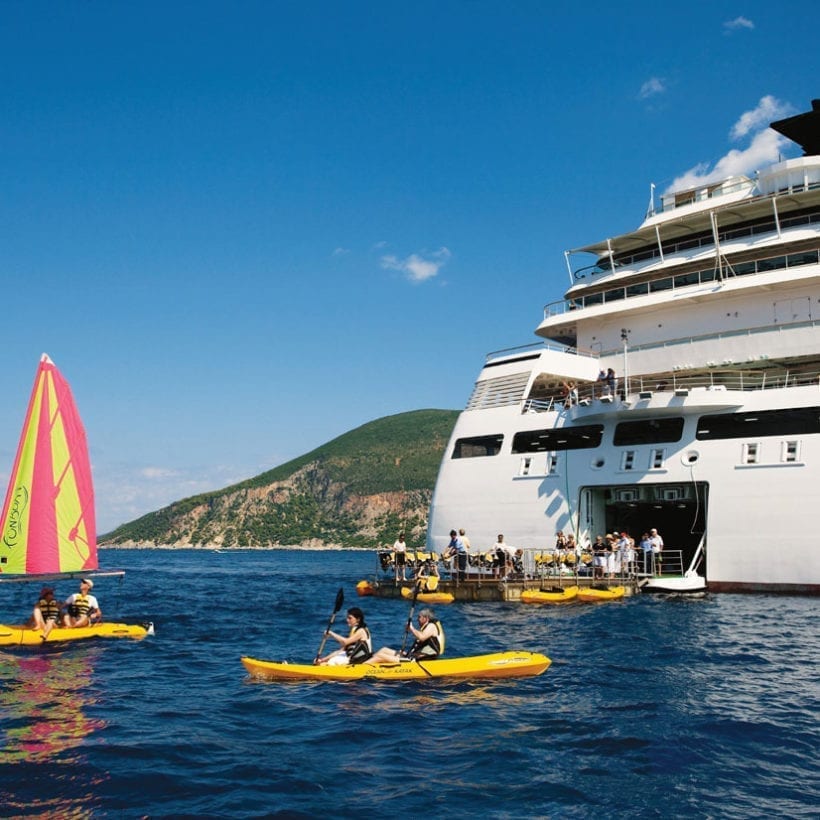Whether it is a quick break pacing the streets of a new city, a week spent horizontal on the beach or a longer adventure, traveling without an environmental footprint is nearly impossible. And it is not just the trek you make to get to your final destination: While taking transportation will create high levels of planet-damaging carbon emissions, your on-the-go impact is likely to be greater too.
But there are changes you can make to reduce your impact. From picking eco-hotels and offsetting your emissions to traveling slower and packing zero-waste solutions, here is how to travel with your conscience intact.
https://www.instagram.com/p/Bsu9Coyo1hD/
Research Tour Operators
When searching for a tour operator, choose companies with an eco-minded ethos. Sorting one from the other can feel overwhelming, so make sure the company you are using has a responsible or sustainable travel policy in place. “The most important thing to look for is transparency, with most reputable travel companies quite happy to provide additional information when asked. Travelers who feel unsure about the credentials of the company that they are traveling with can ask for examples of its conservation and community initiatives, which should be clearly stated and have formal goals and objectives that can be easily measured,” says Joss Kent, CEO of sustainable travel company andBeyond.
Look out for businesses that work with internationally recognized organizations and industry regulation bodies or have won awards for their commitment to sustainability. On the flip side, keep in mind that smaller organizations may still be in the process of receiving such recognition or accolades. “Moving towards a more sustainable business model can take time, not to mention money. If the business demonstrates a commitment to operating more sustainably, they’re probably worth supporting,” says Sarah Reid, a sustainable travel expert.
Choose Eco-Conscious Hotels
In the same vein, take time to research eco-approved hotels for your trip. “Don’t be distracted by greenwashing and look at the whole picture. Choose a hotel that looks both at the macro, say building design, as well as the micro, like their suppliers, staff, amenities and housekeeping practices,” says Juliet Kinsman, founder of Bouteco, a platform showcasing boutique eco-hotels. For example, check if they use renewable energy sources, limit water waste, have a reusable linen policy or prioritize local suppliers.
And if you are questioning where to start? Look at websites that have done the searching for you. Bouteco will help you find hotels that tick both the luxury and eco-friendly boxes, while Green Hotels pinpoints sustainable hotels across many price points and Ecobnb specializes in private rentals.
https://www.instagram.com/p/Bx5VtuBgI_q/
Embrace Slow Travel
Flying is one of the most damaging things we can do for the planet. “We must fly less, take fewer, longer trips and use local transport wherever possible to reduce carbon emissions,” says Justin Francis, CEO of Responsible Travel. According to the World Health Organization, the aviation sector is one of the fastest-growing contributors to greenhouse gas with air travel emissions growing by 5 percent a year globally. Currently, if global aviation was a country, its emissions would be ranked 7th between Germany and South Korea on CO2 alone.
Try and reduce your time in the sky by adopting slower traveling practices. Consider going to fewer places and spending more time in each, or make the journey part of the experience by taking trains. When you have reached your destination, use public transport, bikes or walking to get around where possible.
But if flying is the only option, there are steps you can take to reduce your impact. First, always fly economy. Sitting in business class or first class takes up more space on the plane and therefore creates more environmentally damaging emissions. Specifically, the business class creates on average two-three times more emissions, while first-class seats create six times more. Likewise, flying direct is better than multiple stopovers, considering that the most fuel, and therefore emissions, are used for take-off and landing.
Think about offsetting your emissions, too. You can opt into schemes run by the airline or private organizations that will offset the estimated carbon emissions from your flight into forestry or energy-based projects. Some airlines are more proactive than others (Qantas’ Future Planet scheme is the biggest, while Air Canada and Brussels Airlines also run offsetting projects) but you might want to do it independently. You can work out the amount you need to offset using an online calculator and discover projects to support via Gold Standard.
Support Local Businesses
When traveling or on vacation, try and spend your money locally as much as possible. “Whether it’s hiring a local guide, eating in a restaurant serving local food, staying in a locally owned hotel or shopping in small local shops, choosing local can support conservation and grassroots community development projects,” says Francis. Beyond supporting both the local economy and communities, buying local will help reduce your carbon footprint. The shorter the journey the goods travel, the lower the emissions created.
https://www.instagram.com/p/BvwJC2YgrIn/
Invest in Plastic-Free Solutions
Clever packing is key to reducing your plastic waste while traveling: a reusable water bottle is a must if you do not want to fall in the single plastic trap. Of course, in destinations where tap water is not safe to drink, filling your bottle may be trickier, but you can often ask restaurants or hotels to fill up your reusable bottle with filtered water.
Similarly, bring a reusable coffee cup or metal straw if you like hot drinks or juices on the road. And if you are planning to eat street food or market snacks, think about carrying reusable cutlery and Tupperware, or a metal tiffin tin.
Switch to eco beauty
Consider giving your hygiene routine an eco-makeover, too. Avoid the obvious: face wipes (bad for your skin and the planet), single-use razors, disposable toothbrushes, cotton buds and cotton pads. Instead, swap for reusable or biodegradable options. When it comes to beauty, eschew products that use palm-oil or plastic microbeads, and choose formulas housed in recyclable packaging.
Plus, pack sea-friendly SPF. Chemical SPF filters within sunscreen (in particular octinoxate and oxybenzone) have been linked to coral damage. Considering one-fifth of the world’s coral reefs have already been destroyed, it is important to switch to sun care products that avoid these ingredients. Instead, use physical formulations that use ingredients like zinc oxide to protect your skin from the sun’s harmful rays.
We only recommend products we have independently researched, tested, and loved. If you purchase a product found through our links, Sunday Edit may earn an affiliate commission.







